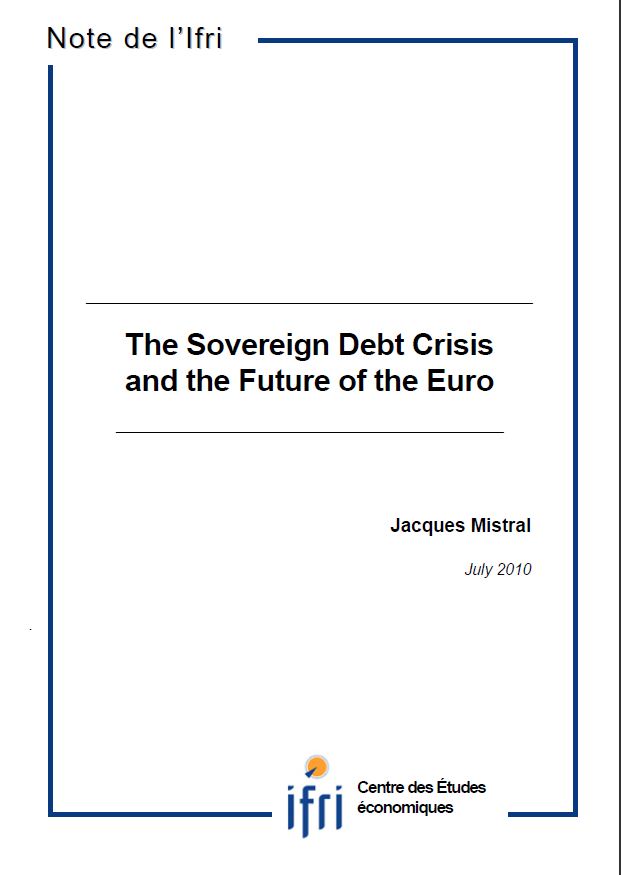The Sovereign Debt Crisis and the Future of the Euro

This crisis forced European governments to recognize the flaws in the design of the monetary union and they responded accordingly. In the short term, fiscal tightening in the Eurozone will not break growth down but restore fiscal credibility. An appropriate exchange rate for the Euro will boost activity as it is already visible. Fears of a Greek default are disproportionate. A default would not be in the interests of Greece, the Eurozone, and other OECD countries; there are huge incentives to find alternative solutions. In the medium term, the survival of the Euro is, contrary to a recent common wisdom, not a question: the debate on fiscal federalism has already taken place twenty years ago and its conclusion was pragmatic. The pressing reasons which pushed back all the principled objections to the creation of the common currency are exactly the same today.
The main result of the crisis has been to give a clear mandate to the European leaders to correct the flaws of this governance and major steps have already been made and will be completed in the coming months. The political difficulties which were witnessed in the spring in designing this new framework should certainly not be minimized, and they are not definitely overcome. However, they have clearly been exaggerated, probably in part due to a deadly mismanagement of communication by European authorities.
Anyway, the results are here and they open much brighter perspectives than before. Budgetary and monetary policies as well as the exchange rate are on a solid footing. The results of the stress tests applied to 91 European banks provide yet another contribution to the restoration of confidence. Nearly everyone praised the transparency under which the exercise was led, in particular in Spain, due to the publication of detailed sovereign debt exposure. There was also sort of a good news in the relatively low level of capital shortfalls.
Significant challenges are still looming. But do not underestimate the reality of a new political economy in the Eurozone: a new policy framework, the implementation of stricter fiscal stability rules under market scrutiny, crisis prevention and management mechanisms already exemplified by the European Financial Stability Facility are huge progresses made in the right direction. It is no surprise in this context that risk aversion is declining and that investors are back. “Invest in the Eurozone”? Now could prove to be good timing, don’t miss it.
(July 28th, 2010)

Available in:
Regions and themes
ISBN / ISSN
Share
Download the full analysis
This page contains only a summary of our work. If you would like to have access to all the information from our research on the subject, you can download the full version in PDF format.
The Sovereign Debt Crisis and the Future of the Euro
Find out more
Discover all our analyses
Korea-EU Direct Investment Links: The Neglected Facet of a Tight Partnership
Despite their difference in size, Korea and the EU have developed over time a strong and deep relation through direct investment flows. Germany dominates the relationship, but there remains ample room for the other EU member-states to further develop their relations with Korea.
The EU and Innovation: When Business Meets Politics
Innovation, entrepreneurship, growth and competitiveness go hand in hand. This short paper looks at two areas where the EU plays a role to help drive innovation: regulation and financing.
A Transatlantic Free Trade Agreement? Weimar Triangle Analyses: French, Polish and German viewpoints on European questions
On an initiative of the German Council of Foreign Relations (DGAP), the Study Committee for Franco-German Relations (Cerfa) of the French Institute of International Relations (IFRI) and the Polish Institute of International Affairs (PISM) are regularly publishing short contributions on a common subject, written by three experts of these institutes. The purpose of these “Weimar Triangle Analyses” is to give the French, Polish, and German views on central questions of European politics and European integration.
Decoupling the Oil and Gas Prices: Natural Gas Pricing in the Post-Financial Crisis Market
This paper looks into natural gas pricing in the post-financial crisis market and, in particular, examines the question whether the oil-linked gas pricing system has outlived its utility as global gas markets mature and converge more rapidly than expected and as large new resources of unconventional gas shift the gas terms-of-trade.





